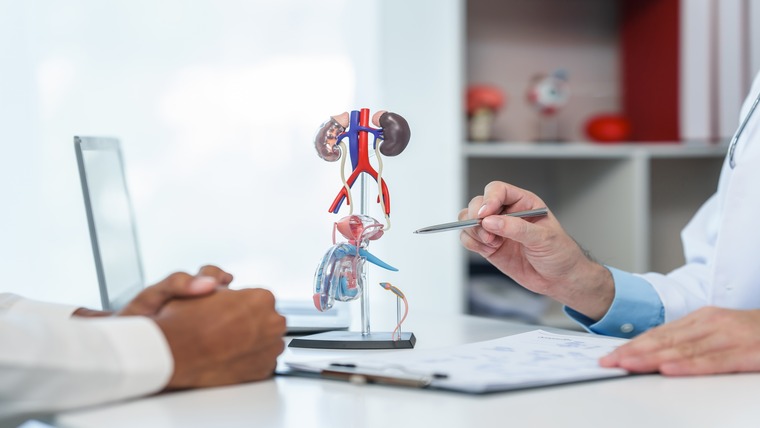
What is the Department of Urology and What Diseases Does It Cover?
Urology is the branch of medicine that deals with the diagnosis and treatment of diseases of the urinary system (kidneys, ureters, bladder and urethra) and male reproductive organs (testicles, epididymis, vas deferens, seminal vesicles, prostate and penis) in men and women.
About the Urology Department
The department of urology specializes in the diagnosis, treatment and management of diseases of the genitourinary system. The department offers a wide range of treatment options, from minimally invasive surgical techniques to open surgery. Urology includes both surgical and medical treatment methods and plays an important role in the management of various diseases.
The main focus areas of the Urology department are:- Urinary system (urinary tract) stone diseases
- Urological Oncology (urinary system cancers)
- Andrology (male reproductive health) and sexual dysfunctions
- Neuro-Urology (urinary system nerve diseases)
- Pediatric Urology
- Reconstructive Urology
- Urogynecology
- Endourology
- Robotic Urology
Who is a Urologist and What Are Their Duties?
A urologist is a doctor who specializes in diagnosing and treating diseases of the urinary tract and male reproductive system.
The duties of urologists include:- Reviewing patients' medical history and performing physical examinations
- Diagnose and treat urinary system diseases
- Performing urological surgeries
- Managing urinary tract cancers
- Andrology and treating sexual dysfunctions
- Managing urinary incontinence
- Providing patients with information about disease prevention and healthy living
- To follow up patients after treatment
What Diseases Does Urology Cover?
The urology department covers many diseases related to the urinary tract and the male reproductive system.
These diseases include:- Urinary System Stone Diseases: These diseases involve the formation of stones in the urinary tract (kidneys, ureters, bladder or urethra). Stones are formed by the crystallization of various minerals and acids. They can cause symptoms such as severe pain, nausea, vomiting and blood in the urine.
- Prostate Diseases: The prostate is a gland located under the bladder in men. It includes diseases such as prostate enlargement, prostate cancer and prostatitis (inflammation of the prostate). These disorders usually manifest themselves with symptoms such as difficulty urinating, frequent urination and sexual dysfunction.
- Bladder Diseases: These include bladder infections, bladder cancer, overactive bladder syndrome, etc. These diseases usually cause symptoms such as frequent urination, a burning sensation during urination, pelvic pain, and sometimes blood in the urine.
- Male Infertility: It covers various conditions that affect male reproductive ability. Problems with sperm production or transportation, hormonal imbalances, varicocele, etc. are examined under this category. It is usually detected as a result of couples' unsuccessful efforts to have children.
- Urinary Incontinence: It is the inability to hold or control urine. There are types such as stress incontinence, urge incontinence, and mixed incontinence. It manifests itself with symptoms such as leakage of urine during physical activity, coughing or sneezing, and a sudden need to urinate.
- Childhood Urinary System Diseases: Undescended testicle, vesicourethral reflux.
- Kidney, bladder, prostate, testicular cancers
- Male erectile dysfunction
What Are Urology Examinations?
Urology examinations include various tests used to diagnose diseases of the urinary tract and male reproductive system.
These examinations include:- Physical Examination
- Urine Analysis and Culture
- Blood Tests
- Imaging Methods
- Urodynamics
- Cystoscopy
When Should You Go to the Urology Department?
A urologist should be consulted in the following cases:
- Pain, burning or straining when urinating
- Blood in the urine
- Frequent urination or incontinence
- Pain in the lower abdomen or groin area
- Sexual dysfunctions in men
- Pain or swelling in the testicles
- Infertility
- Childhood testicular disorders, testicle not being in place
- Circumcision (for religious or medical reasons)
What is Done During a Urology Examination?
During the urology examination, the patient's general health status and complaints are evaluated in detail.
The process typically involves these steps:- Taking Medical History: The patient's complaints, past illnesses and family history are questioned.
- Physical Examination: The abdomen, genital area and, in men, the prostate are examined.
- Urinalysis: A urine sample is taken and analyzed.
- Blood Tests: Necessary blood tests are requested.
- Imaging: Imaging methods such as ultrasound, CT or MRI may be performed.
- Special Tests: When deemed necessary, special tests such as urodynamics and cystoscopy may be planned.
- Treatment: After diagnosis, appropriate treatment methods are planned and the patient is informed.














